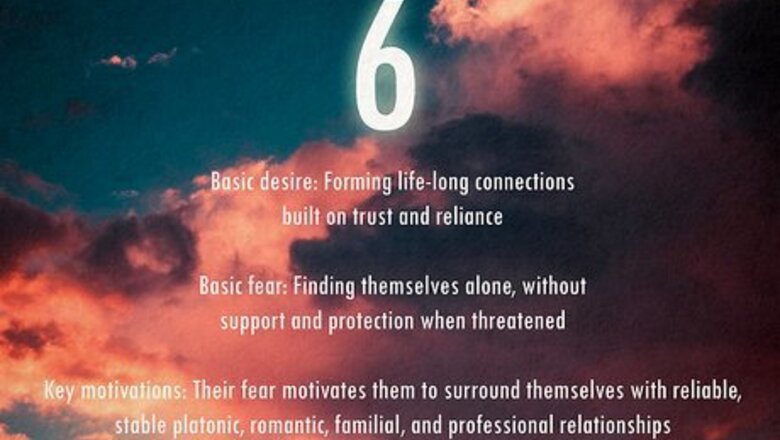
views
- Enneagram Type 6s are loyal, trustworthy, responsible, and dedicated. They often become successful paralegals, medical professionals, and police officers.
- Type 6s are analytical and nurturing individuals who can offer valuable insights to keep their communities safe and secure.
- Many 6s struggle with anxiety and paranoia, which can cause them to become more codependent on those they trust and less trusting of people they don’t know.
Enneagram Type 6 Key Traits
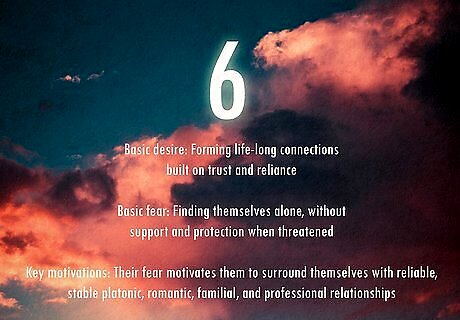
Type 6s are known as the Loyalists or Skeptics. Individuals with this personality type crave close connections because of the safety and security they offer. Sixes are resourceful team players looking to maintain a positive vibe within their social groups or organizations. Basic desire: Forming life-long connections built on trust and reliance. Basic fear: Finding themselves alone, without support and protection when threatened. Key motivations: Their fear motivates them to surround themselves with reliable, stable platonic, romantic, familial, and professional relationships.
Enneagram Type 6 Strengths

Type 6s are dedicated to their friends and beliefs. 6s are “ride or die” people who won’t hesitate to go down with the ship if it’s for someone or something they truly believe in. As naturally suspicious individuals, earning a Six's trust may take a while. However, no one can question their loyalty. There isn’t a thing they wouldn’t do to protect and support the people and ideologies they believe in.

They’re analytical. As a Head Type, 6s approach the world from the center of intelligence. They’re not afraid to question someone’s beliefs or behaviors if it means keeping themselves and their loved ones safe. In fact, 6s don’t believe in trusting their gut. They believe in trusting their intellect instead. Similarly, this makes them reliable people during times of crisis. Instead of letting emotion cloud their judgment, 6s can take a moment to think of the bigger picture. Enneagrams are divided into three types: Heart, Head, and Body. Heart Types make decisions based on feelings, Body Types follow their gut, and Head Types follow logic and reason.

They’re team players. Sixes are friendly folks who thrive in community-oriented environments. They enjoy the collaboration process, where they can offer their insights to provide valuable solutions. Similarly, in the same way they crave stability and security in their relationships, they strive to offer the same to others in their group, organization, or team. Sixes are often called the “glue” or the “heart” of their relationships, as they’re the ones who hold everything together.

6s are caring and nurturing. Even if a Six doesn’t agree with everything a loved one says or does, their loyalty and generous nature goes beyond that. They can identify other people’s passions and will go to great lengths to see others succeed, even if it means putting their own wants and needs aside.
Enneagram Type 6 Weaknesses

Type 6s struggle to break away from toxic relationships. Once a Six is loyal to you, it can be hard for them to leave behind the familiar and enter the unknown. 6s may suffer from anxiety and fear being without security and support from the people or groups they’re a part of. It often causes them to stay in toxic relationships that may cause them emotional harm.

They tend to have an over-active imagination. Sixes are natural worriers, and when they feel their security and safety are threatened, they may become more paranoid and suspicious of others. All the walls they broke down go back up, and they may withdraw from their communities. In this scenario, 6s struggle to ask others for help, not because of a lack of support, but because they don’t feel worthy of it.

Type 6s may appear suspicious and pessimistic. It takes a while for a Six to build trust, and at first, people with this personality type often question the motives of others. Similarly, if they’re not feeling someone, they project their emotions, concerns, and worries onto other group members, creating rifts in their relationships.

5s are prone to anxiety and depression. When left alone with their active imagination, 6s can become paranoid and suspicious of anyone and anything. It may lead to debilitating anxiety, causing them to withdraw from others and stick to themselves. They may become more codependent on the people they trust. If you struggle with anxiety, contact a mental health professional or a trusted loved one for guidance.
Enneagram Type 6 Levels of Development
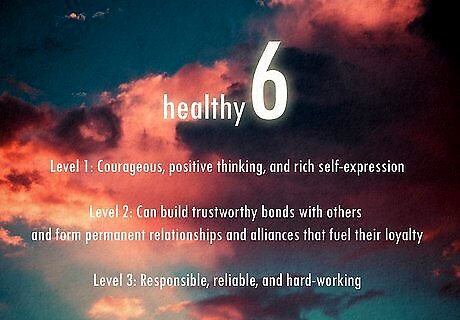
Healthy Type 6s operate at levels 1 to 3. At healthy levels, 6s are the best versions of themselves. In this case, they may feel more liberated and free as they embark on a journey of self-awareness. They become capable of moving past the Enneagram’s core fears. Level 1: Courageous, positive thinking, and rich self-expression. Sixes can rely on themselves to get the affirmations they need rather than depending on external relationships to offer that for them. Level 2: Sixes can build trustworthy bonds with others and form permanent relationships and alliances that fuel their loyalty. Level 3: Responsible, reliable, and hard-working. At this stage, Sixes demonstrate their dedication to the people and movements in which they truly believe by showing their caring and nurturing side.
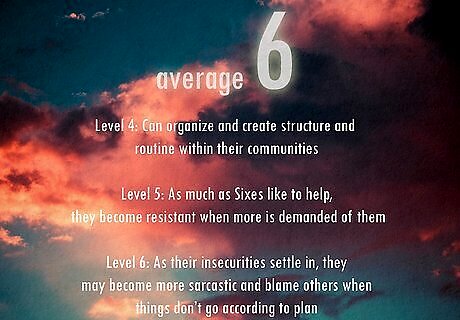
Average Type 6s operate at levels 4 to 6. This stage may also be called the “normal” level in which most people function. At this stage, they can find a balance between their fears and motivations to meet their responsibilities. Level 4: As individuals who crave stability, Sixes use their time and energy to organize and create structure and routine within their communities. Level 5: People tend to rely on them for guidance or delegate additional tasks to them. As much as Sixes like to help, they become resistant when more is demanded of them. It makes them feel like their efforts aren't enough. Level 6: As their insecurities settle in, they may become more sarcastic and blame others when things don’t go according to plan. They also become more resistant to and suspicious of new relationships or ideas.
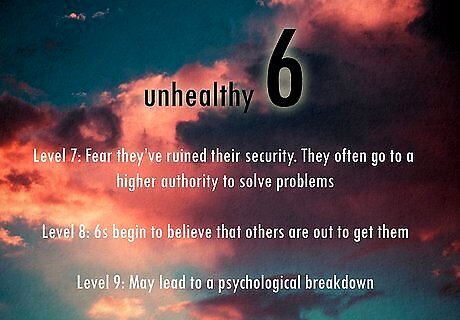
Unhealthy Type 6s operate at levels 7 to 9. At these levels, Sixes begin to showcase destructive behavioral patterns and allow their fears to take the front seat. They become more reactive and aware of their insecurities to the point where they may become out of touch with reality. Level 7: Sixes become more worrisome at this level and fear they’ve ruined their security. They often go to a higher authority, like a group leader or parent, to solve problems. Level 8: 6s begin to believe that others are out to get them. They become more irrational and pessimistic. Level 9: This final stage may lead to a psychological breakdown. A 6’s anxiety may become debilitating at this stage, and they may rely on alcohol to lessen their anxiety. If you are struggling with anxiety or other mental health disorders, contact a medical doctor or therapist for help.
Enneagram Type 6 Subtypes & Wings
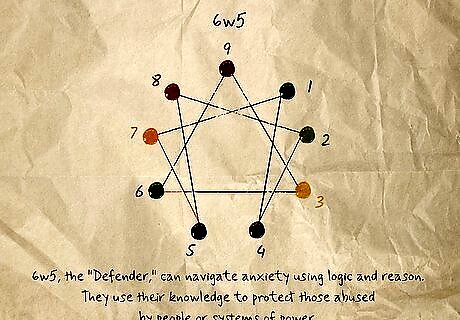
6w5 The Enneagram wings help others better understand themselves by showing the connection between correlating types. A Type 6 with a 5 wing is an person who can navigate their anxiety using logic and reason. This personality type, also called the Defender, uses their knowledge to protect those abused by people or systems of power. Individuals with this personality type are often politicians or social activists who strive to enact positive change in the world. Type 5s are the Investigators who value knowledge and self-sufficiency.
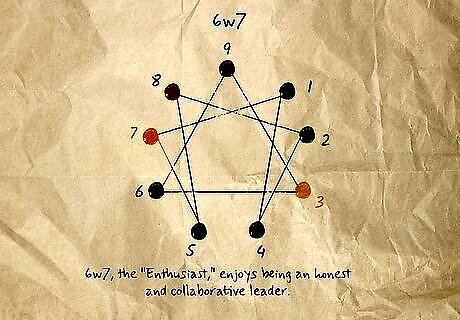
6w7 A Type 6 with a 7 wing enjoys being an honest and collaborative leader. They believe in being for the people rather than serving their own private agendas. Type 7s tend to be charismatic individuals who help inspire others by realizing their inner potential. At the same time, Sixes champions the voice of their leaders. Individuals with this personality type are often entertainers, police officers, or real estate agents. Type 7s are known as Enthusiasts who strive for thrilling and fulfilling lives.
Growth Opportunities for Enneagram Type 6s

Practice self-awareness. When you’re feeling anxious, it’s helpful to develop a self-awareness practice that can help you identify why you’re acting or feeling a certain way. Ask yourself, “What am I terrified of?” or “What happened that’s making me feel this way?” Doing so can help you look back at your situation more objectively. Becoming more self-aware can be as simple as listening to an online guided meditation, teaching you how to relax your body and slow your mind with controlled breathing. You can also try journaling your thoughts and feelings. Afterward, read the words aloud or in your head to identify patterns or triggers.

Learn to feel safe and protect yourself. Feeling protected by someone else is always nice, but learning new safety measures can be beneficial when flying solo. Try boxing or karate, or sign up for a self-defense class. If that isn’t your speed, that’s okay. If you’re exploring a new city, map out multiple routes. Instead of listening to music, keep your volume low or completely off so you can be aware of your surroundings.

Develop healthy anxiety coping mechanisms. Anxiety is a common experience for Sixes. Instead of relying on unhealthy coping mechanisms, learn to overcome anxiety by engaging in regular physical activity to boost your mood and release any physical tension in your body. Similarly, prioritize getting plenty of rest to approach the new day feeling more alert and present.

Ask for help from loved ones or a medical professional. While it may feel natural for a Six to isolate initially, it’s important to remember the community you’ve built for yourself. You are surrounded by love and support, and those who truly love you will want to be there for you. Contact trusted friends, family members, mentors, or a licensed therapist for additional support.
Enneagram Type 6 Compatibility

Type 6 & Type 1 This duo shares similar values regarding loyalty in their relationships. Type 1s can teach their Type 6 counterparts how to be more loyal to themselves through decision-making rather than following the lead of a higher authority. Similarly, 6s can help 1s get in touch with their more emotional side to build stronger relationships with others. Type 1s are Reformers who pride themselves on integrity and balance.

Type 6 & Type 2 When a Type 6 pairs up with a 2, they share a beautiful relationship built on love and safety. 2s strive to help their partner by keeping them calm and maintaining a positive, upbeat attitude during times of stress. Together, they can provide one another peace of mind and a safe space to become more vulnerable. Type 2s are Helpers who desire love, appreciation, and positivity and strive to provide that to others.

Type 6 & Type 3 This dream team has big dreams. Type 3s are constantly looking for new ways to receive approval and acceptance from others. In comparison, Type 6s are eager to support innovative ideas. They are both hard-working individuals who won’t stop to achieve their ambitions. While 6s tend to be more worrisome, 3s offer them positive affirmations to help build a stronger sense of self-confidence. Type 3s are Achievers who quickly develop innovative solutions to achieve their goals.

Type 6 & Type 4 6s and 4s share a deep connection to their emotions, finding meaning and purpose in their relationship. While it may be intense, they share a deep sense of security and can navigate the highs and lows together. As imaginative individuals, 4s can create unique ways to solve issues, while 6s offer their counterpart realistic expectations. Type 4s are the Individualists who fight against conformity and favor individuality.

Type 6 & Type 5 5s are calming individuals who know how to soothe the mind of the worrisome 6. In these relationships, they value communication, commitment, and understanding. It is difficult for 5s to have someone rely on them. Fortunately, 6s are prepared to take the role of the protector or provider—so long as their counterpart is willing to do the same. They have a give-and-take relationship. Type 5s are the Investigators who use their insights to navigate the world safely from potential threats.

Type 6 & Type 6 When 6s meet, it’s a match destined to last. They’re both devoted to each other and find it easy to be vulnerable. While anxiety is prone in both of them, when one sees the other struggle, they know exactly how to pull the other out of a depressive episode.

Type 6 & Type 7 7s are charismatic individuals who bring plenty of love, light, and laughter into their relationship with a 6. While 7s struggle with their fear of commitment, 6's loyalty and dedication make them feel secure and confident. However, it does require plenty of effective community at the start of their relationship to see them thrive. Type 7s are Enthusiasts who are positive individuals who crave relationships that make them feel fulfilled.

Type 6 & Type 8 As natural defenders and advocates, this duo is a force to be reckoned with. They both see the world's dangers and strive to protect the disadvantaged. However, Type 8s tend to take more of an active leadership role. Meanwhile, 6s work in the background, offering expertise or advice when needed. Type 8s are Challengers who believe in taking control of their lives and destinies.

Type 6 & Type 9 6s and 9s share a peaceful relationship built on maintaining a balance between their personal and romantic lives. They value their individuality and alone time but enjoy sharing their opinions and ideas. 9s offer peace of mind to their worrisome counterpart, which helps 6s feel more safe and secure in their relationship. Type 9s are Peacemakers who pride themselves on their trustworthiness and ability to keep things calm.
Enneagram Type 6 Careers

6s thrive as paralegals, medical professionals, and police officers. 6s work best in fields that align with their core values and where they feel motivated by a worthy cause, like helping people or fighting against injustice. Similarly, they prefer roles where they can be a team player and offer insight solutions to potential problems. Other career options include: Safety Inspector Occupational Health Specialist Teacher or Professor Executive Assistant

Type 6s are the most rare of the enneagram types. Only 5.6% of the population shares the same personality trait alongside these influential figures: Prince Harry Joe Biden Tom Hanks Richard Nixon Marilyn Monroe Gwen Stefani Ellen Degeneres




















Comments
0 comment